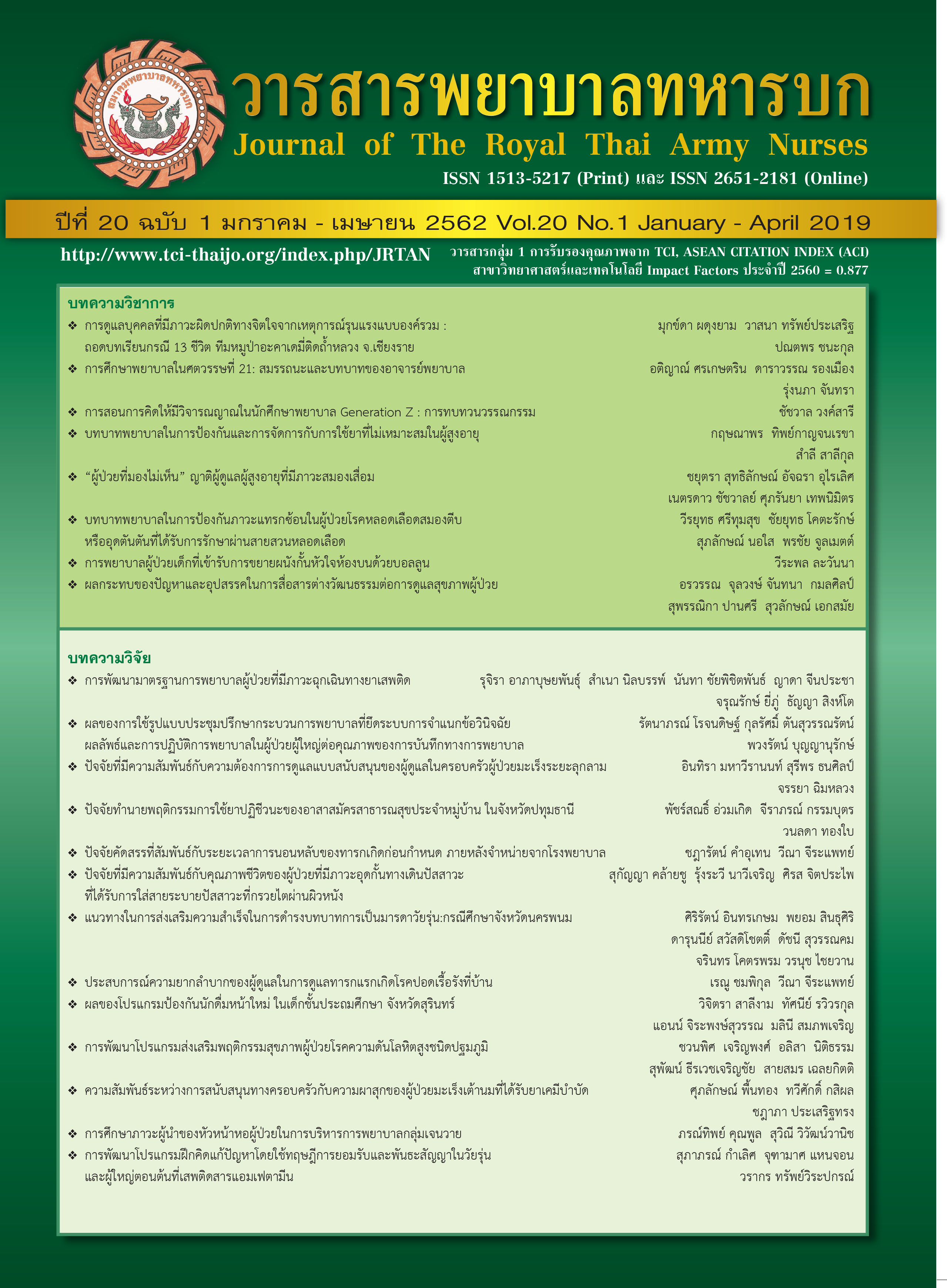Development of a Nursing Standards for Drug Emergency Patients
Keywords:
Nursing standard, Drug Emergency PatientsAbstract
This study was a research and development aiming to study and develop a nursing standard for drug emergency patients. The research was divided into three phase; (1) surveying and investigating the background of the problem, (2) developing the nursing standard for drug emergency patients (3) assessing the result of the guideline. The research sample comprised of three groups. The first sample group was 20 people of medical and nurse administrators, registered nurses and patient’s relatives. The second group of the sample was 20 specialists, and the third group consisted of 75 patients, 32 relatives and 38 registered nurses. The research instruments comprised of a semi - structured interview question, a feedback questionnaire for the nursing standard, a patient’s severity classification form, a satisfied questionnaire for the relative, a knowledge measurement form, a performance assessing form and a satisfied questionnaire for the qualified nurse. The analysis methods were a content analysis, a descriptive statistic and a paired sample t-test. The result indicated that; (1) the classification and referral systems, the standard guideline and knowledge enhancement for the related staffs should be developed, (2) five nursing standard for drug emergency patients has been launched, and (3) most of the patient was the critical condition and urgent patients, and the nurses can follow well the guideline. The score of the post-test was significantly higher than pretest at 0.05. The satisfaction of the relatives and nurses on the guideline was very good level.
Downloads
References
2. Angoon P The emergence of psychiatric drugs. Teaching document. The course of treatment, rehabilitation in drug and substance abuse patients with complications of crisis and emergency. Princess Mother National Institute on Drug abuse Treatment. Pathumthani, 2017. (In Thai)
3. Viroj V. Addiction Medicine Handbook. Thayarak Intitule. Medical Department Ministry of Public Health. Veterans Publishing House. Bangkok, 2005. (In Thai).
4. European Monitoring Centre for Drugs and Drug Addiction. Hospital emergency presentations and acute drug toxicity in Europe: update from the Euro-DEN Plus research group and the EMCDDA, Publications Office of the European Union, Luxembourg., 2016
5. Chaveewan D. Develop standards for nurses to receive prenatal care for pregnant women in Khon Kaen Hospital. Reseach Report: Khon Kaen Hospital. Khon Kaen, 2000. (In Thai)
6. Varo P. Statistics for Social Science Research. Suviriyasasin. Bangkok, 2010. (In Thai).
7. Nipa K. and et al. The performance of nurses specializing in drugs over the next decade. (AD 2010-2019). Thayarak Intitule. Medical Department Ministry of Public Health. Nonthaburi, 2010. (In Thai).
8. Emergency Medical. Guidelines to follow the rules, criteria and procedures sorting and prioritization of emergency care at the emergency room, Access On 2 August 2018, 2011. (In Thai).
9. Pratheung P. Delphi technique. Journal of Research and Development, (3), 38-49, 1987. (In Thai).
10. Ann A., Natee L. Development and Evaluation of Evidence-based Nursing Protocol for Patients with Moderate to Severe Traumatic Brain njury. Journal of the Royal Thai Army Nurses. 2018; 19 (1): 107 – 116 (In Thai)
11. Weerakitti S, Warapasakul C, Chumjam B. Nursing system development for risk of medication errors protocol on participation of nursing model for prevention medication errors rate. Journal of Nurse’ Association of Thailand, north-Eastern Division. 2103; 31(2), 25-35. (In Thai)
Downloads
Published
How to Cite
Issue
Section
License
บทความหรือข้อคิดเห็นใดใดที่ปรากฏในวารสารพยาบาลทหารบกเป็นวรรณกรรมของผู้เขียน ซึ่งบรรณาธิการหรือสมาคมพยาบาลทหารบก ไม่จำเป็นต้องเห็นด้วย
บทความที่ได้รับการตีพิมพ์เป็นลิขสิทธิ์ของวารสารพยาบาลทหารบก
The ideas and opinions expressed in the Journal of The Royal Thai Army Nurses are those of the authors and not necessarily those
of the editor or Royal Thai Army Nurses Association.






